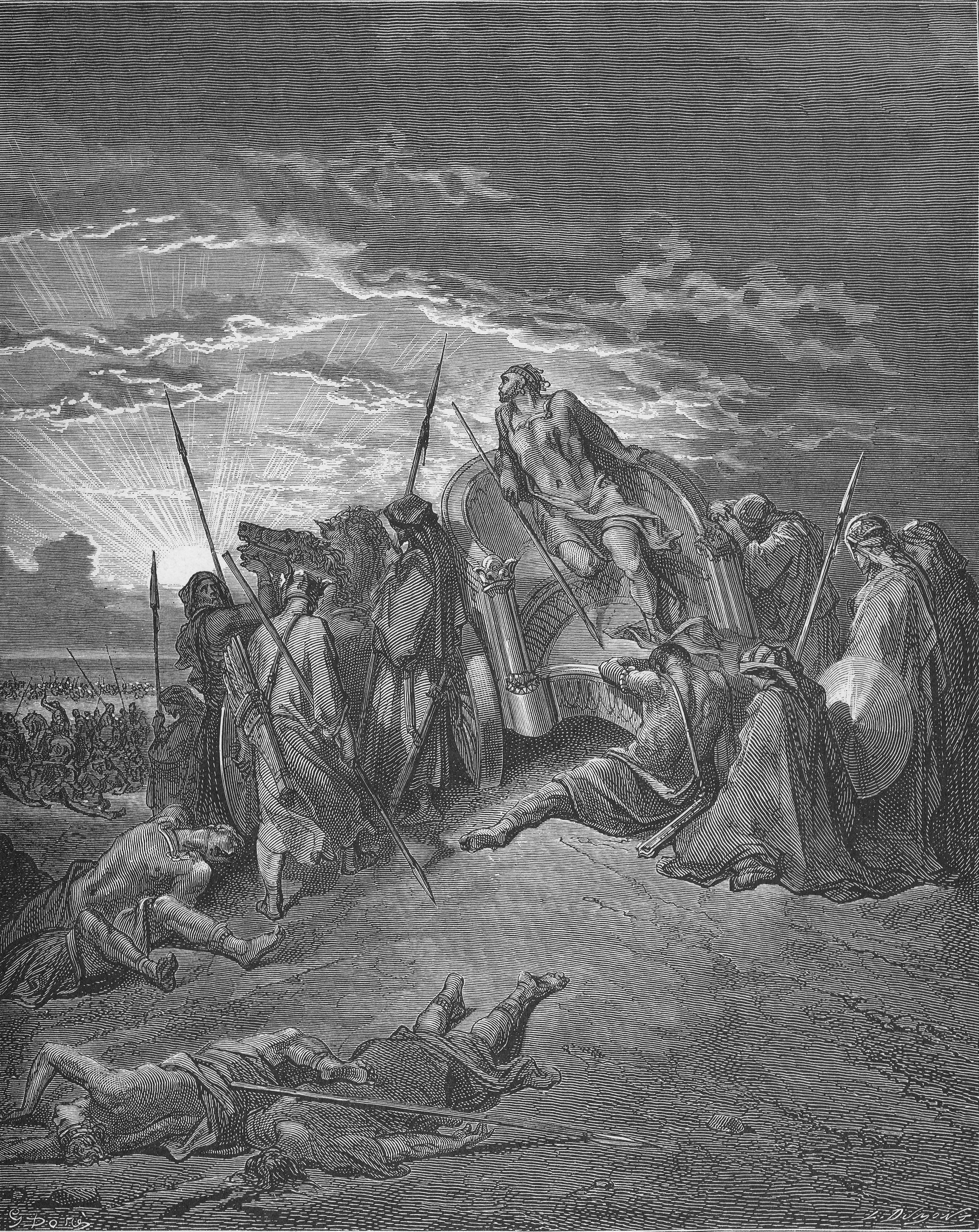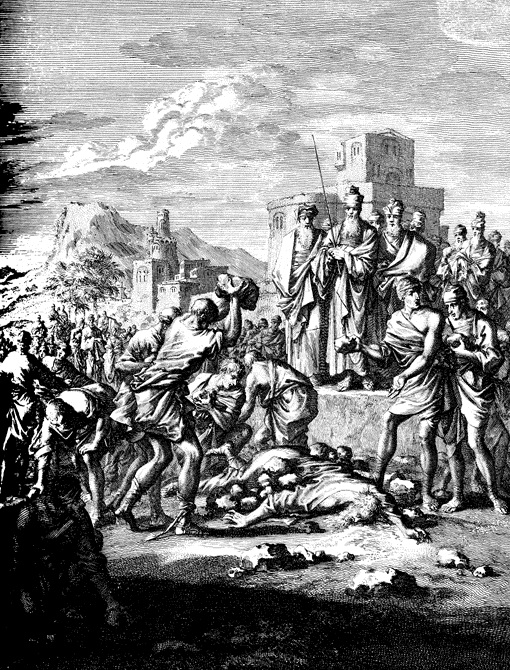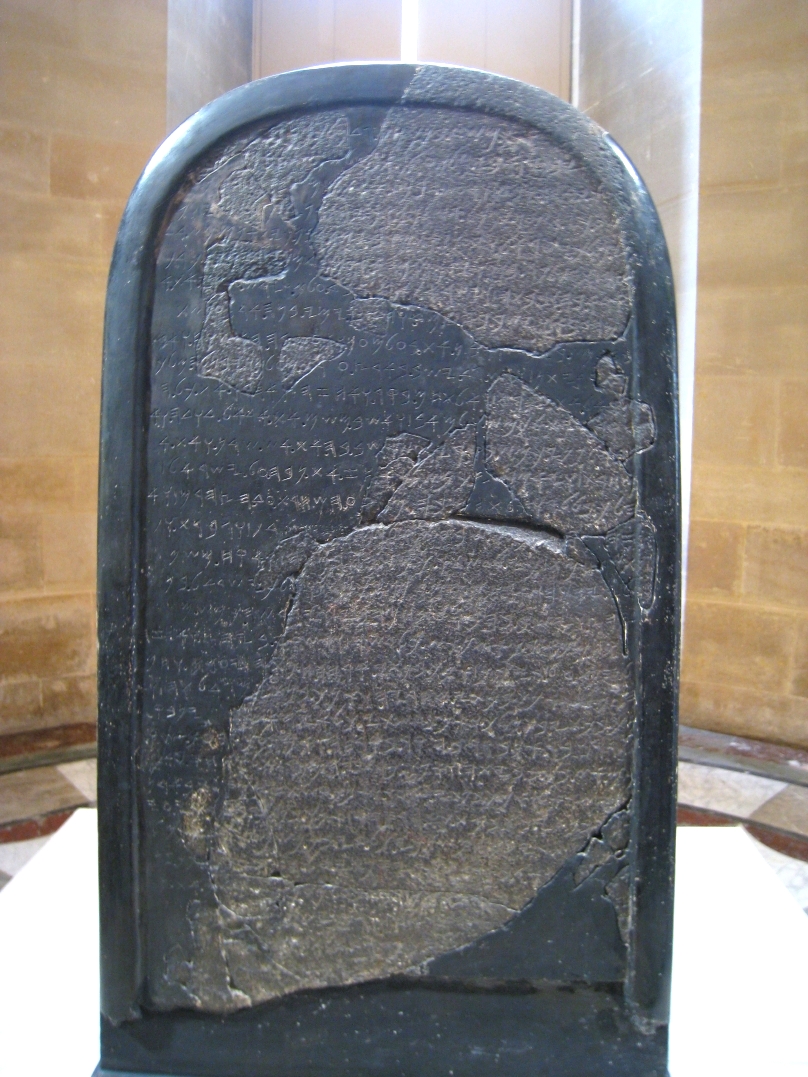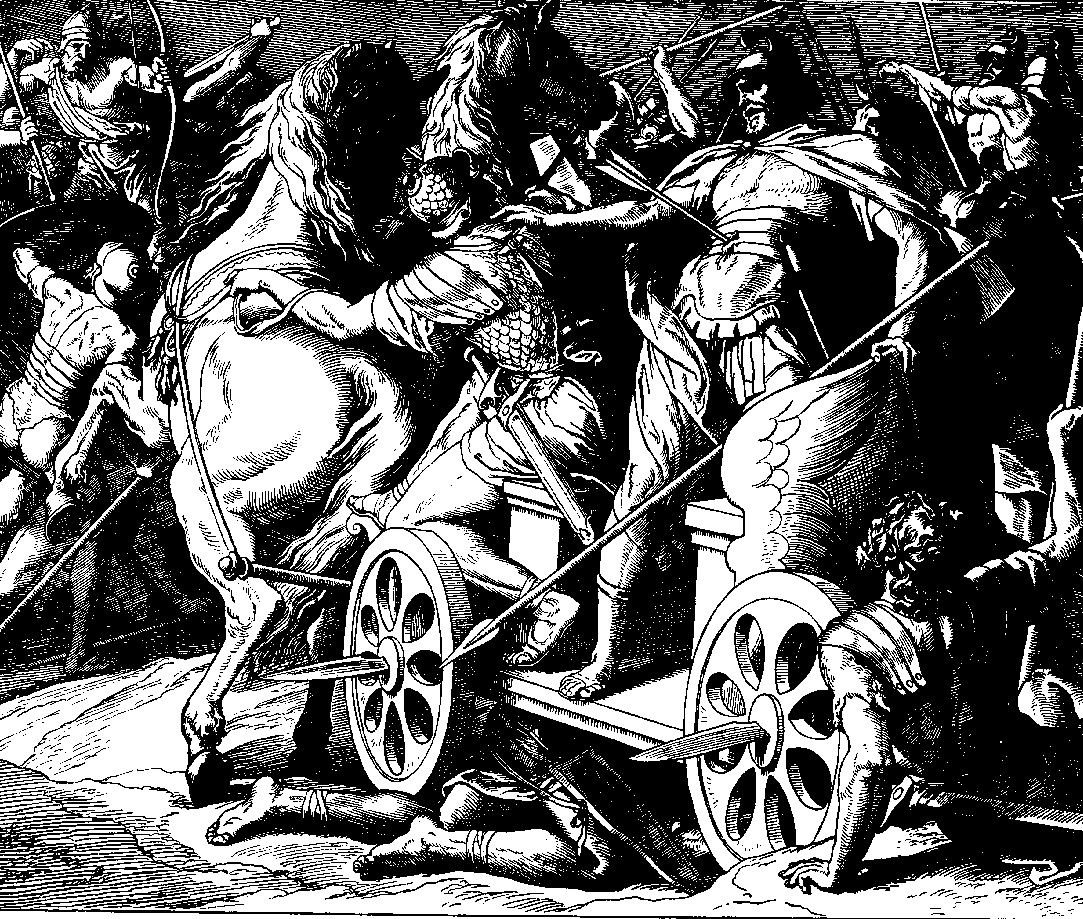|
Ahab
Ahab (; akk, 𒀀𒄩𒀊𒁍 ''Aḫâbbu'' 'a-ḫa-ab-bu'' grc-koi, Ἀχαάβ ''Achaáb''; la, Achab) was the seventh king of Israel, the son and successor of King Omri and the husband of Jezebel of Sidon, according to the Hebrew Bible. The Hebrew Bible presents Ahab as a wicked king, particularly for condoning Jezebel's influence on religious policies and his principal role behind Naboth's arbitrary execution. The existence of Ahab is historically supported outside the Bible. Shalmaneser III of Assyria documented in 853 BC that he defeated an alliance of a dozen kings in the Battle of Qarqar; one of these was Ahab. He is also mentioned on the inscriptions of the Mesha Stele. Ahab became king of Israel in the thirty-eighth year of King Asa of Judah, and reigned for twenty-two years, according to 1 Kings. William F. Albright dated his reign to 869–850 BC, while Edwin R. Thiele offered the dates 874–853 BC. Most recently, Michael Coogan has dated Ahab's reign ... [...More Info...] [...Related Items...] OR: [Wikipedia] [Google] [Baidu] |
1 Kings
The Book of Kings (, '' Sēfer Məlāḵīm'') is a book in the Hebrew Bible, found as two books (1–2 Kings) in the Old Testament of the Christian Bible. It concludes the Deuteronomistic history, a history of Israel also including the books of Joshua, Judges and Samuel. Biblical commentators believe the Books of Kings were written to provide a theological explanation for the destruction of the Kingdom of Judah by Babylon in c. 586 BCE and to provide a foundation for a return from Babylonian exile.Sweeney, p1/ref> The two books of Kings present a history of ancient Israel and Judah, from the death of King David to the release of Jehoiachin from imprisonment in Babylon—a period of some 400 years (). Scholars tend to treat the books as consisting of a first edition from the late 7th century BCE and of a second and final edition from the mid-6th century BCE.Fretheim, p. 7 Contents The Jerusalem Bible divides the two Books of Kings into eight sections: *1 Kings 1: ... [...More Info...] [...Related Items...] OR: [Wikipedia] [Google] [Baidu] |
Naboth
Naboth ( he, נבות) was a citizen of Jezreel. According to the Book of Kings in the Hebrew Bible, he was executed by Queen Jezebel so that her husband Ahab could possess his vineyard. Narrative 1 Kings 21:1-16 states that Naboth owned a vineyard, in proximity to King Ahab's palace in the city of Jezreel. Because of this, Ahab desired to acquire the vineyard so that he could use it for a vegetable (or herb) garden. Since he inherited the land from his ancestors, Naboth refused to sell it to Ahab. According to the Mosaic law, the law forbade the permanent selling of land. Frustrated at not being able to procure the vineyard, Ahab returned to his palace and went to bed without eating anything. His wife, Jezebel, after learning the reason for his being upset, asked mockingly, "Are you not the king?" She then said that she would obtain the vineyard for him. To do so, she sent a letter, under Ahab's name, to the elders and nobles of Naboth's city, instructing them to entrap Nabo ... [...More Info...] [...Related Items...] OR: [Wikipedia] [Google] [Baidu] |
Jezebel
Jezebel (;"Jezebel" (US) and ) was the daughter of of Tyre and the wife of Ahab, King of Israel, according to the Book of Kings of the (). According to the bibli ... [...More Info...] [...Related Items...] OR: [Wikipedia] [Google] [Baidu] |
Battle Of Qarqar
The Battle of Qarqar (or Ḳarḳar) was fought in 853 BC when the army of the Neo-Assyrian Empire led by Emperor Shalmaneser III encountered an allied army of eleven kings at Qarqar led by Hadadezer, called in Assyrian ''Adad-idir'' and possibly to be identified with King Benhadad II of Aram-Damascus; and Ahab, king of Israel. This battle, fought during the 854–846 BC Assyrian conquest of Aram, is notable for having a larger number of combatants than any previous battle, and for being the first instance in which some peoples enter recorded history, such as the Arabs. The battle is recorded on the Kurkh Monoliths. Using a different rescension of the Assyrian Eponym List would put the battle's date at 854 BC. The ancient town of Qarqar at which the battle took place has generally been identified with the modern-day archaeological site of Tell Qarqur near the village of Qarqur in Hama Governorate, northwestern Syria. According to an inscription later erected by Shalmanese ... [...More Info...] [...Related Items...] OR: [Wikipedia] [Google] [Baidu] |
Omrides
The Omrides, Omrids or House of Omri ( he, , translit=Bēt ʿOmrī; akk, 𒂍𒄷𒌝𒊑𒄿, translit=bīt-Ḫûmrî) were a ruling dynasty of the Kingdom of Israel (Samaria) founded by King Omri. According to the Bible, the Omride rulers of Israel were Omri, Ahab, Ahaziah and Jehoram. Ahab's daughter Athaliah also became queen regnant of the Kingdom of Judah. Five Assyrian records, some of which with known duplicates, are known to refer to either "Land of Omri" or "House of Omri". An archaeological reference to Omri and his unnamed son is found in the Mesha Stele, the only Northwest Semitic inscription known to reference this name. Biblical account The Bible generally portrays the Omrides unfavorably, stressing their apostasy from the religion of Yahweh in favor of Baal. It devotes little attention to Omri aside from noting his establishment of the dynasty and foundation of Israel's new capital of Samaria. In contrast, his son Ahab is the subject of an extended narrative ... [...More Info...] [...Related Items...] OR: [Wikipedia] [Google] [Baidu] |
Omri
Omri ( ; he, , ''‘Omrī''; akk, 𒄷𒌝𒊑𒄿 ''Ḫûmrî'' 'ḫu-um-ri-i'' fl. 9th century BC) was, according to the Hebrew Bible, the sixth king of Israel. He was a successful military campaigner who extended the northern kingdom of Israel. Other monarchs from the House of Omri are Ahab, Ahaziah, Joram, and Athaliah. Like his predecessor, king Zimri, who ruled for only seven days, Omri is the second king mentioned in the Bible without a statement of his tribal origin. One possibility, though unproven, is that he was of the tribe of Issachar. Nothing is said in Scripture about the lineage of Omri. His name may be Amorite, Arabic, or Hebrew in origin.Thiel, W., "Omri", ''The Anchor Bible Dictionary'', p. 17, vol. 5, D.N. Freedman (ed.). New York: Doubleday (1992) Omri is credited with the construction of Samaria and establishing it as his capital. Although the Bible is silent about other actions taken during his reign, he is described as doing more evil than all t ... [...More Info...] [...Related Items...] OR: [Wikipedia] [Google] [Baidu] |
Ahaziah Of Israel
Ahaziah (, "Yah has grasped"; also gr, Ὀχοζίας, ''Ochozias'' in the Septuagint and the Douai-Rheims translation) was the eighth king of the northern Kingdom of Israel and the son of Ahab and Jezebel. Like his father, he reigned from Samaria. William F. Albright has dated his reign to 850-849 BC, while E. R. Thiele offers the dates 853-852 BC. The author of the ''Books of Kings'' criticized him for following the ways of his father Ahab and his mother Jezebel, and for making Israel sin "in the way of Jeroboam the son of Nebat". Biblical commentator Albert Barnes notes that the phrase "in the way of his mother" does not occur anywhere else in the Hebrew Bible, and demonstrates the strong feeling of the writer of the Books of Kings as to the influence of Jezebel. Reign During his reign the Moabites revolted against his authority (). This event is recorded on the Mesha stele, an extensive inscription written in the Moabite language. Ahaziah formed a business partners ... [...More Info...] [...Related Items...] OR: [Wikipedia] [Google] [Baidu] |
Athaliah
Athaliah ( el, Γοθολία ''Gotholía''; la, Athalia) was the daughter of either king Omri, or of King Ahab and Queen Jezebel of Israel, the queen consort of Judah as the wife of King Jehoram, a descendant of King David, and later queen regnant c. 841–835 BCE. Biblical narrative Accounts of the life of Athaliah are to be found in 2 Kings 8:16–11:16 and 2 Chronicles 22:10–23:15 in the Hebrew Bible. The text states that she was the daughter of king Omri of Israel, however, she is usually considered to have been the daughter of King Ahab and his wife, Queen Jezebel. Some scholars are of the opinion that Athaliah was indeed the daughter of Omri, but that she grew up as an orphan in the court of Ahab. Athaliah was married to Jehoram of Judah to seal a treaty between the kingdoms of Israel and Judah, and to secure his position Jehoram killed his six brothers. Jehoram became king of Judah in the fifth year of Joram of Israel's reign (). Depending on her paternity, ... [...More Info...] [...Related Items...] OR: [Wikipedia] [Google] [Baidu] |
Kingdom Of Israel (Samaria)
The Kingdom of Israel (), or the Kingdom of Samaria, was an Israelite kingdom in the Southern Levant during the Iron Age. The kingdom controlled the areas of Samaria, Galilee and parts of Transjordan. Its capital, for the most part, was Samaria (modern Sebastia). The Hebrew Bible depicts the Kingdom of Israel as one of two successor states to the former United Kingdom of Israel ruled by King David and his son Solomon, the other being the Kingdom of Judah; most historians and archaeologists, however, do not believe in the existence of a United Kingdom as depicted in the Bible.The debate is described in Amihai Mazar, "Archaeology and the Biblical Narrative: The Case of the United Monarchy" (see bibliography), p.29 fn.2: "For conservative approaches defining the United Monarchy as a state “from Dan to Beer Sheba” including “conquered kingdoms” (Ammon, Moab, Edom) and “spheres of influence” in Geshur and Hamath cf. e.g. Ahlström (1993), 455–542; Meyers (1998); Le ... [...More Info...] [...Related Items...] OR: [Wikipedia] [Google] [Baidu] |
Samaria (ancient City)
Samaria ( he, שֹׁמְרוֹן, translit=Šōmrōn; grc, Σαμάρεια, ''Samareia''; ar, السامرة, ''as-Samira'') was a city in the historical region of Samaria that served as the capital of the northern Kingdom of Israel during the 9th and 8th centuries BCE. Towards the end of the 8th century BCE, possibly in 722 BCE, Samaria was captured by the Neo-Assyrian Empire and became an administrative center under Assyrian, Babylonian, and Persian rule. During the early Roman period, the city was expanded and fortified by Herod the Great, who renamed it “ Sebastia” in honor of emperor Augustus. The ancient city's hill is where the modern Palestinian village of Sebastia, which retains its Roman name, is located. The archeological site, subject to a shared Israeli-Palestinian control, is located on the hill's eastern slope. Etymology Samaria's biblical name, ''Šōmrōn'' (שֹׁמְרוֹן), means "watch" or "watchman" in Hebrew. The Bible derives the name from ... [...More Info...] [...Related Items...] OR: [Wikipedia] [Google] [Baidu] |
Ramoth-Gilead
Ramoth-Gilead ( he, רָמֹת גִּלְעָד, meaning "Heights of Gilead"), was a Levitical city and city of refuge east of the Jordan River in the Hebrew Bible, also called "Ramoth in Gilead" (; ; ) or "Ramoth Galaad" in the Douay–Rheims Bible. It was located in the tribal territorial allotment of the tribe of Gad. Biblical events According to (), Ramothgilead was the base of Ben-Geber, one of King Solomon's regional governors. He was responsible for ("to him belonged") the towns of Jair the son of Manasseh, in Gilead and the region of Argob in Bashan: sixty large cities with walls and bronze gate-bars. It appears to have been lost to Syria (Aram-Damascus) during the battles between the northern kingdom of Israel and Syria, as Ahab, King of Israel, proposed to go to battle to win it back. After consulting prophets about the prospects of success, Ahab went to fight for Ramoth in Gilead, aided by Jehoshaphat, King of Judah. During the battle, Ahab was wounded by an arrow ... [...More Info...] [...Related Items...] OR: [Wikipedia] [Google] [Baidu] |
Jehoram Of Israel
Jehoram ( ''Yəhōrām''; also Joram) was the ninth king of the northern Kingdom of Israel ( 2 Kings 8:16, 2 Kings 8:25–28). He was the son of Ahab and Jezebel, and brother to Ahaziah and Athaliah. According to 2 Kings, 2 Kings 8:16, in the fifth year of Jehoram of Israel, (another) Jehoram became king of Judah. The author of Kings speaks of both Jehoram of Israel and Jehoram of Judah in the same passage. Reign Jehoram began to reign in Israel in the 18th year of Jehoshaphat of Judah and ruled 12 years ( 2 Kings 3:1). William F. Albright dated his reign to 849–842 BCE, whereas E. R. Thiele proposed 852–841 BCE. Unlike his predecessors, Jehoram did not worship Ba'al, and he removed the pillar of Baal, probably a special pillar which Ahab had erected near his palace at Jezreel for his own and Jezebel's worship. However, the writer of 2 Kings says that he still "followed in the ways of Jeroboam, son of Nebat, who led the Israelites to sin". With Jehoshaphat of Judah, ... [...More Info...] [...Related Items...] OR: [Wikipedia] [Google] [Baidu] |









